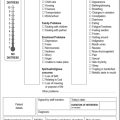22 Advancing disease
Case update
Assessment and holistic care
Make a list of what you think the main concerns and worries might be for:
What do you think their current understanding of Michelle’s illness is?
As the nurse looking after Michelle, consider what your main concerns would be.
Make a list of the other information that is needed to make a holistic assessment of Michelle.
Case update
Breaking bad/significant news
http://www.eastmidlandscancernetwork.nhs.uk/Library/BreakingBadNewsGuidelines.pdf (accessed November 2011).
Fujimorl M., Uchitomi Y. Preferences of cancer patients regarding communication of bad news: a systematic literature review. J. Clin. Oncol.. 2009;39(4):201–216.
Girgis A., Sanson-Fisher R., Schofield M. Is there consensus between breast cancer patients and providers on guidelines for breaking bad news? Behav. Med. 1999;25(2):69–77.
Points to consider
We now consider what might be causing each of the symptoms Michelle is experiencing.
Back pain
Now write a plan for Michelle to help manage her spinal cord compression.
Drudge-Coates L., Rajbabul K. Diagnosis and management of malignant cord compression: part 1. Int. J. Palliat. Nurs.. 2008;14(3):110–116.
Drudge-Coates L., Rajbabul K. Diagnosis and management of malignant cord compression: part 2. Int. J. Palliat. Nurs.. 2008;14(4):175–180.
Morgan H., Cawley D. Recognising metastatic spinal cord compression and treatment. End of Life Care. 2009;3(4):15–21.
Points to consider
Points to consider
Kyle G. Constipation and palliative care – where are we now? Int. J. Palliat. Nurs.. 2007;13(1):6–16.
Larkin P., Sykes N.P., Centeno C., et al. The management of constipation in palliative care: clinical practice recommendations. Palliat. Med.. 2008;22:796–807.
Nancekivell-Smith R. Assessment and management of constipation in terminal disease. End of Life Care. 2010;4(3):56–63.
Points to consider
O’Connor M.. An uncertain journey: coping with transitions, survival and recurrence. Payne S., Seymour J., Ingleton C. Palliative care nursing: principles and evidence for practice, second ed., Maidenhead: Open University Press, 2008.
Goodhead A. The importance of the nursing role in spiritual care of patients. End of Life Care. 2008;2(2):34–37.
Case update
Complex discharge
List what the challenges might be in planning this discharge.
For example, consider the following:
 Support for Simon who is tired and missing work.
Support for Simon who is tired and missing work.
 Additional nursing care needed and involvement of community teams. Some of the services that might be available to the family are a night care service, for example Marie Curie Cancer Care, or a local hospice. Find out what is available in your local area.
Additional nursing care needed and involvement of community teams. Some of the services that might be available to the family are a night care service, for example Marie Curie Cancer Care, or a local hospice. Find out what is available in your local area.
Make a list of the practitioners who might be involved in discharge planning. Go back to the list of roles you were introduced to in Chapter 7.
Points to consider
In the Chapter 16, we explored the importance of knowing what the patient’s priorities of care are and giving them choices about their care. When planning the discharge of a person with advancing disease, it is important to keep their needs central to the discharge process. It is important to consider the wider team working and ensure the discharge is planned in a safe and appropriate way. The above article focuses on the discharge of a woman with advanced multiple sclerosis, giving you ideas of how skills and knowledge can be transferred across disease pathways.
The National End of Life Care Programme Website has up-to-date information and publications on all aspects of end of life care and is a good starting point to search for local and national publications, policies and ways of working: http://www.endoflifecareforadults.nhs.uk/ (accessed May 2011)
healthtalkonline is a charity-run Website that shares patients’ experiences by facilitating them to tell their own story – many of these stories are presented in short film clips of 1–2 minutes. You can choose from a variety of headings including receiving bad news, cancer, and dying and bereavement: http://www.healthtalkonline.org/ (accessed May 2011).








